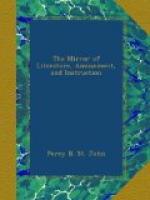During the first ten or fifteen years after its establishment, the college of the palace had probably followed the court during its frequent migrations, notwithstanding the number of members, and the difficulty of transporting the library, which soon became considerable. Many circumstances, however, seem to show, that after the construction of the great palace at Aix-la-Chapelle, it became fixed in that place. The library, we know, was there concentrated; and several of the books thus collected, such as the Codex Carolinus, &c. have come down through a long line of emperors to the present day. Indeed, a great part of the most valuable literature of former ages, was preserved alone by the efforts of the French monarch for the revival of science; and the link of connexion between ancient and modern civilization, owes its existence, as much to the endeavours of Charlemagne, as even to the papal preservation of antique Rome.
* * * * *
WRITING IN FRANCE.
In the reign of Charlemagne, in the year 796, the mode of writing underwent a change. The rude characters employed under the Merovingian race were disused, and the small Roman letters were introduced. As the spirit of improvement proceeded, new alterations were sought; and some years afterwards, to write in the large Roman capitals, became the mode of the day, the initial letter of each paragraph being always highly ornamented, and sometimes painted, many specimens of which have come down to the present time. Though at an advanced[12] period of life when this method of writing first began to prevail, Charlemagne endeavoured to learn it, and even caused models of the letters to be laid by his pillow, that during the waking moments of the night, he might practise the art which he sought to acquire.
[12] I do not know whether it be worth while to attempt to refute the opinion which has been founded on an erroneous passage in Eginhard, that Charlemagne could not write. Eginhard understood, as Gibbon says, the court and the world, and the Latin language, it is true; but, nevertheless, we may much more rationally believe that the secretary made use of a vague expression, than suppose that he wished to imply, in one sentence, the manifest contradiction of Charlemagne being in the habit of going through all the abstruse calculations of astronomy, in an age when those calculations were most complicated, without being able to write. The whole of Charlemagne’s life renders the supposition absurd. He studied under Alcuin, whose first rule was to teach the most correct orthography in writing. We know that he subscribed many deeds, though his signature was abbreviated, to render it as rapid as possible. Eginhard himself states, that the monarch wrote the history of the ancient kings in verse: and Lambecius, one of the highest antiquarian authorities, declares, that the imperial library still contains a manuscript,




